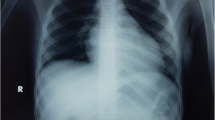Abstract
The autoimmune polyglandular syndromes (APS) are rare immune-mediated endocrinopathies causing destruction of multiple endocrine and non-endocrine organs. Involvement of adrenal glands associated with any type of APS results in Addison’s disease. While patients with Addison’s disease often suffer from symptoms of neuroglycopenia, lethal hypotension and hypoglycemia are uncommon. Here, we report a fatal case of APS type 1 with hypotension and profound hypoglycemia in a 24-year-old man who was found unconsciousness at home and progressively evolved into pulseless electrical activity. Although his condition was initially considered to be possibly due to drug toxicity, subsequent drug screening tests failed to detect alcohol or any other substances. Emergent medical evaluation revealed severe hypotension (51/30 mm/Hg) and profound hypoglycemia (blood glucose of 20–30 mg/dl). Despite vigorous supportive care, the patient died following 3 days of respiratory dependency due to irreversible anoxic brain injury. Postmortem examination revealed severely atrophic adrenal glands with lymphocytic infiltration. Subsequent review of the patient’s medical history and correlation with autopsy findings confirmed the presence of multiple organ involvement, consistent with APS type 1. This case serves as a reminder for forensic pathologists that death from an acute adrenal (Addisonian) crisis, while uncommon, should remain a differential diagnostic consideration. Furthermore, it underscores the fact that Addison’s disease can occur as part of a constellation of autoimmune manifestations within the context of an underlying polyglandular syndrome, such as APS type 1.



Similar content being viewed by others
References
Husebye ES, Perheentupa J, Rautemaa R, Kampe O. Clinical manifestations and management of patients with autoimmune polyendocrine syndrome type I. J Intern Med. 2009;265:514–29.
Bruserud O, Oftedal BE, Landegren N, Erichsen MM, Bratland E, Lima K, et al. A longitudinal follow-up of autoimmune polyendocrine syndrome type 1. J Clin Endocrinol Metab. 2016;101:2975–83.
Huibregtse KE, Wolfgram P, Winer KK, Connor EL. Polyglandular autoimmune syndrome type I - a novel AIRE mutation in a north American patient. J Pediatr Endocrinol Metab. 2014;27:1257–60.
Meyer G, Hackemann A, Reusch J, Badenhoop K. Nocturnal hypoglycemia identified by a continuous glucose monitoring system in patients with primary adrenal insufficiency (Addison's disease). Diabetes Technol Ther. 2012;14:386–8.
Tsujimoto T, Yamamoto-Honda R, Kajio H, Kishimoto M, Noto H, Hachiya R, et al. Vital signs, QT prolongation, and newly diagnosed cardiovascular disease during severe hypoglycemia in type 1 and type 2 diabetic patients. Diabetes Care. 2014;37:217–25.
Christensen TF, Tarnow L, Randlov J, Kristensen LE, Struijk JJ, Eldrup E, et al. QT interval prolongation during spontaneous episodes of hypoglycaemia in type 1 diabetes: the impact of heart rate correction. Diabetologia. 2010;53:2036–41.
Gruden G, Giunti S, Barutta F, Chaturvedi N, Witte DR, Tricarico M, et al. QTc interval prolongation is independently associated with severe hypoglycemic attacks in type 1 diabetes from the EURODIAB IDDM complications study. Diabetes Care. 2012;35:125–7.
Reno CM, Daphna-Iken D, Chen YS, VanderWeele J, Jethi K, Fisher SJ. Severe hypoglycemia-induced lethal cardiac arrhythmias are mediated by sympathoadrenal activation. Diabetes. 2013;62:3570–81.
Author information
Authors and Affiliations
Corresponding author
Additional information
Publisher’s note
Springer Nature remains neutral with regard to jurisdictional claims in published maps and institutional affiliations.
Rights and permissions
About this article
Cite this article
Suknuntha, K., Yu, Q., Weisman, P.S. et al. Fatal adrenal crisis due to Addison’s disease arising in the context of autoimmune polyglandular syndrome type 1. Forensic Sci Med Pathol 16, 166–170 (2020). https://doi.org/10.1007/s12024-019-00204-4
Accepted:
Published:
Issue Date:
DOI: https://doi.org/10.1007/s12024-019-00204-4



